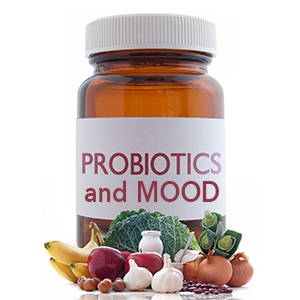Probiotics for Health
 Did you know that Probiotics can help your mood?
Did you know that Probiotics can help your mood?
For thousands of years, clinicians have observed a connection between the gut, brain, and overall health. Hippocrates is famously quoted as saying “all disease begins in the gut.” This should not come as a surprise to anyone who has ever experienced gastrointestinal (GI) symptoms like diarrhea, indigestion, or abdominal discomfort in response to changes in their emotional state. The gut and brain communicate through neural, endocrine and immune pathways. It has become increasingly clear that interactions with intestinal microbiota play an important part in this communication.
Recent insights into the role of the human microbiota in cognitive and affective functioning have led to the hypothesis that probiotic supplementation may act as an adjuvant strategy to ameliorate or prevent depression. In a recent research study (Reference below), 20 healthy participants without current mood disorder received a 4-week probiotic food-supplement intervention, while 20 control participants received an inert placebo for the same period. In the pre- and post-intervention assessment, cognitive reactivity to sad mood was assessed using the revised Leiden index of depression sensitivity scale. It was exciting to see that the participants who received the 4-week multispecies probiotics intervention showed significantly reduced depression, less repetitive negative thoughts and less aggressive thoughts. Yeah probiotics!
These results provide the first evidence that the intake of probiotics may help reduce negative thoughts associated with a sad mood. Stay tuned for more research on this topic including studies which look at whether it’s better to take a multi-strain versus a single species probiotic and whether probiotics will help prevent depression in people who are at high risk for this condition.
Tips for taking Probiotics
- Most probiotic supplements are best taken with a meal, and ideally with, or just before breakfast.
- Probiotics should not be taken directly with a hot drink.
- For those who are unable to swallow capsules, you can get a powder probiotic and add to smoothies or sprinkle on foods
- Probiotics should not interfere with other medicines or herbal/natural remedies
- It is advised to drink plenty of water while taking probiotics.
- You can also find probiotics in many common foods. Yogurt is the most well-known source of probiotics. They’re also in other dairy items like buttermilk, some soft cheeses, fermented and unfermented milk, and kefir. Soy drinks and products like miso and tempeh have them. You can also find these healthy bacteria in kimchi, sauerkraut, and many pickles.
REFERENCES:
Steenbergen L, Sellaro R, van Hemert S, Bosch JA, Colzato LS. A randomized controlled trial to test the effect of multispecies probiotics on cognitive reactivity to sad mood. Brain Behav Immun. 2015, Apr 7.

Leave a Reply